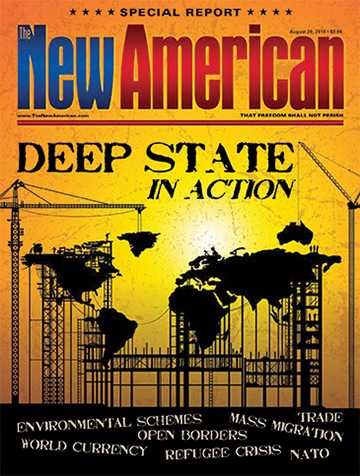UN “Environmental” Schemes Advance World Government
Imagine a future in which the “carbon emissions” of everything you do — literally everything — are tracked, monitored, and controlled by a global authority. Each nation has been allocated a “carbon budget” by this global authority based on its historical emissions. America, which industrialized early on, has a tiny budget, while India, where most people still live in appalling conditions, would have a somewhat larger one. National governments, which serve as administrative units for global and regional authorities, have divided up their carbon budgets among their populations. No more than one child per family is allowed, a policy pioneered by the Communist Chinese dictatorship, which top United Nations climate bureaucrats often tout as a model of climate sense and sustainability. If you exceed your carbon budget, watch out.
Sound far-fetched? It isn’t. In fact, in its “Fifth Assessment Report,” or AR5, the UN Intergovernmental Panel on Climate Change calculated a “carbon budget” for humanity that it claims must be adhered to if humanity is going to have a “50 percent” chance of keeping alleged man-made warming below 2 degrees Celsius. “Limiting the warming caused by anthropogenic CO2 emissions alone with a probability of >33 per cent, >50 per cent, and >66 per cent to less than 2°C since the period 1861–1880, will require cumulative CO2 emissions from all anthropogenic [man-made] sources to stay between 0 and about 1560 GtC [gigatons of carbon], 0 and about 1210 GtC, and 0 and about 1000 GtC since that period respectively,” the summary claims. “An amount of 531 [446 to 616] GtC, was already emitted by 2011.”
In response, the European Union and national governments started plotting how to divvy that budget up. “Justice demands that, with what little carbon we can still safely burn, developing countries are allowed to grow,” declared Indian Prime Minister Narendra Modi the day before the UN climate summit in Paris got under way. In Europe, national and EU policymakers also hopped on the bandwagon. “The publication of a carbon budget by the IPCC increases the urgency and importance of the UN process and of future COP [UN Conference of the Parties] meetings,” Conservative Party Parliamentarian Tim Yeo declared. “Work should start at once on the establishment of a fair apportionment of emissions country by country, based on the principle of contraction and convergence. Greater efforts must be made to develop a worldwide emissions trading system since cap and trade is the one policy tool whose successful deployment could guarantee that the IPCC carbon budget is met.”
JBS Member?
Sign in with your ShopJBS.org account.
 Subscribe Now
Subscribe Now
- 12 Issues Per Year
- Digital Edition Access
- Digital Insider Report
- Exclusive Subscriber Content
- Audio provided for all articles
- Unlimited access to past issues
- Cancel anytime.
- Renews automatically
 Subscribe Now
Subscribe Now
- 12 Issues Per Year
- Print edition delivery (USA)
*Available Outside USA - Digital Edition Access
- Digital Insider Report
- Exclusive Subscriber Content
- Audio provided for all articles
- Unlimited access to past issues
- Cancel anytime.
- Renews automatically


